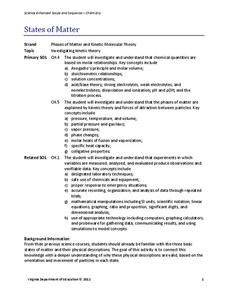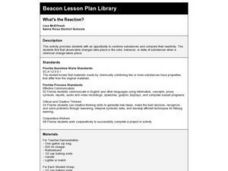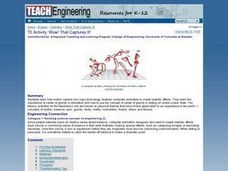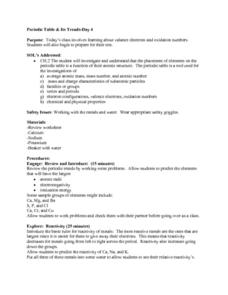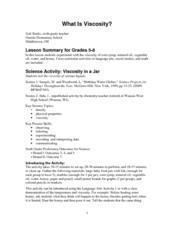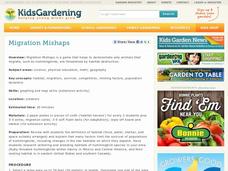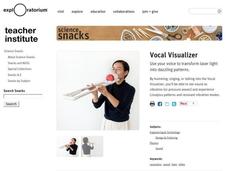Curated OER
"States of Matter"
Learners investigate the different states of matter by experimenting in class. In this matter lesson plan, students participate in a lab activity moving from one station to the next creating different formations of matter....
Curated OER
Mammal Morphology - Bats, People, and Other
For this physical characteristics worksheet, students compare bats and humans by putting a + sign in the chart for whether or not bats and humans have the same characteristics. Students do this for 17 characteristics and answer 3 questions.
Curated OER
Build Your Own Hovercraft
Learners construct a hovercraft following specific procedures. In this technology lesson, students explain the physics principles behind hovercraft. They compare and contrast this machine with the aircraft.
Curated OER
TE Activity: Hot or Not
Students examine how the human immune system responds to germs and explain what a fever is. They design a thermometer in order to further explore temperature before completing a temperature conversion worksheet. They detail the work of...
Curated OER
Changes in the Copper Penny
Third graders explore the difference between a physical change in a substance and a chemical change. students study the volume, density, altering shape and chemistry of a copper penny.
Curated OER
Properties Homework
In this properties of matter worksheet, students ask a parent or adult at home for a noun. Students then list the physical properties, the chemical properties, the extensive properties and the intensive properties of the noun. Students...
Curated OER
What's the Reaction?
Learners combine baking soda and vinegar and observe the chemical and physical changes that this mixture can produce.
Curated OER
Solids, Liquids and Gases - Part 2
Students experiment with balloons, soda water and raisins to find out about the states of matter. In this solids, liquids and gases lesson, students complete a group activity with balloons to recognize the state of matter in it....
Curated OER
Applied Science - Physics (K) Post Lab
Students are introduced to electricity. In this electricity lesson, students listen to the book Switch on, Switch off by Melvin Berger and discuss the use of electricity in light switches. They create a picture of an atom using pom...
Curated OER
TE Activity: Wow! That Captures It!
Students examine how motion capture technology allows computer based animators to design realistic effects in animation. They study how the center of gravity contributes to animation and how to use the center of gravity to write an...
Curated OER
Periodic Table And Its Trends - Day 4
Guide your chemistry class through the periodic table so that they are able to identify atomic radii, electronegativity, and ionization energy. Give them three metals to place in water to observe reactivity. Teach them to write electron...
Curated OER
Light My Fire!
High schoolers draw a diagram that shows the law of reflection. In this physics lesson, students investigate the relationship between the angle of incidence and angle of reflection. They explain how light travels as it reflects on a...
Curated OER
Circuits and Conductors
Young scholars explore electricity by completing Internet activities. In this physical science lesson, students identify an electric circuit and describe the characteristics of conductors, giving examples as well. Young...
Curated OER
Commotion About Motion
Second graders are introduced to different types of motion. They make rolling spider toys and race them on different surfaces to invsetigate forces and motion. Pupils make glue "spider webs" for their spiders after testing different...
Tech Museum of Innovation
Energy at Play
Get the ball rolling and challenge your class to figure out how to make a ball move. The instruction segment is between two STEM activities devoted to doing just that. The first is simple and involves making a ball move from some...
Curated OER
What Is Viscosity?
Students experiment with the visocosity of corn syrup, mineral oil, vegetable oil, water, and honey. They research viscosity before beginning. Pupils draw the conclusion that the marble sinks more slowly in the liquids with greater...
National Gardening Association
Migration Mishaps
Elementary ecologists pretend to be migratory hummingbirds. They fly between wintering and nesting grounds, trying to reach a habitat haven. In a musical-chair fashion, some birds will miss out, and are removed from the game. To further...
Star Wars in the Classroom
Star Wars Geography Unit
What kind of animals live on an ice planet like Hoth? How would the habitat on Tatooine allow different organisms to thrive? Connect social studies, science, and Star Wars in one engaging activity that focuses on the ecosystems...
Acoustical Society of America
Musical Instruments Part I - Woodwinds
What is the connection between sound and vibration? Learners find out as they conduct a series of experiments with instruments they create. The experiment is well explained, includes modifications for visuall and hearing impaired...
CK-12 Foundation
Position and Displacement Simulation
How can we use vectors to determine a person's position when traveling? The simulation offers guided practice at determining the coordinates and the distance between coordinates on a map grid. It reinforces the importance of positive...
Exploratorium
Vocal Visualizer
Make sound visible with an activity that provides directions for how to build a vocal visualizer meant to create light patterns. Making noise into the visualizer causes a mirror to vibrate, reflecting a laser beam, and creating...
Space Awareness
Model of a Black Hole
Even light cannot leave the force of a black hole! Learners use a model to explore the gravitational force of a black hole. An elastic bandage and heavy ball serve to create the hole, while marbles become the victims of its strong force.
InqueryPhysics
Interpreting Motion Graphs
Every movement in the world can be measured and even motionless objects can be significant indicators of movement. Focus on motion graphs that feature distance vs. time, speed vs. time, and positive and negative acceleration.
Virginia Department of Education
The Cycles of Nature
Encourage peer collaboration and assist with the creation of visual aids to identify carbon, water, and nitrogen cycles as your class learns more about nature. They discuss relative information, create a visual aid...


